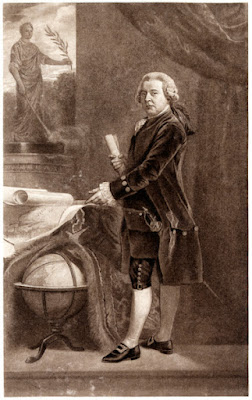 |
| John Adams (from an early engraving.) |
History is an uncertain science, at best.
Much of it is outright
lies and balderdash. For example, Napoleon looked at history as “a set of lies
agreed upon.” Does it matter that he stole most of that line from Voltaire, who
suggested, “History is a lie commonly agreed upon?”
George Santayana
harbored significant doubts about the entire field. He told friends, “History
is a pack of lies about events that never happened told by people who weren’t
there.”
Too much of history
rests on the memories of old men, old men whose minds have grown soft over
time. Even the best men have doubts and question themselves as time goes by.
They question the history books.
Fifty years after
signing the Declaration of Independence, John Adams wrote Thomas Jefferson,
wondering, “Who shall write the history of the American Revolution? Who can
write it? Who will ever be able to write it?”[1]
Take, for example, the
Declaration of Independence. The proceedings of Congress were held behind
closed doors. No records were kept. With the death of each congressman, more of
the story was lost. And the recollections that surfaced were suspect.
 |
| John Adams as an old man. |
John Adams suspected the published version of John Dickinson’s speech against the Declaration was entirely unlike the one he heard that day. Thomas Jefferson questioned the claim that Samuel Chase was the first to suggest independence. He asked Adams, “do you remember anything of this? I do not.”[2]
If the two leading
members of the committee tasked to oversee the Declaration of Independence
questioned how it all came about, how much of its history can we believe?
John Adams was the
red-haired stepchild of the Revolution.
Many people disliked his bluntness. They called him vain or disagreeable, but
he was there at every critical turn.
When it came time to
pick a commander for the Continental Army, Adams looked past the sectionalism
that ran rampant in congress. While a New England general would have been more
to his liking, John Adams understood a Southerner would cement the army
together. Especially one of George Washington’s stature. Adams pushed for an American Navy when no one
else saw the need for one. Later, he helped shape the peace treaty to end the
war.
Without John Adams,
there would very likely be no United States. Charles Lee, Artemus Ward, or John
Hancock, rather than George Washington, might have commanded the Continental
Army. No one can say what would have happened then. Without a strong navy, the
United States would never have been able to stand up to Great Britain during
the War of 1812.
John Adams could have
won a second term as president if he had declared war on France during the
so-called Quasi-War. It would have been the popular
thing to do. Certainly, no one would have
faulted him for jumping into the fray.
But Adams never worried about popularity as much as he did about doing the right thing. He sent a peace commission to France and ended the matter amicably.
Because of that decision,
Adams lost the election. No matter, he took the loss in stride. He wrote his
son John Quincy, “I feel my shoulders relieved from the burden. The short remaining of my days will be the happiest
of my life.”[3] George Washington
would have understood. Being President was not all it was cracked up to be.

No comments:
Post a Comment